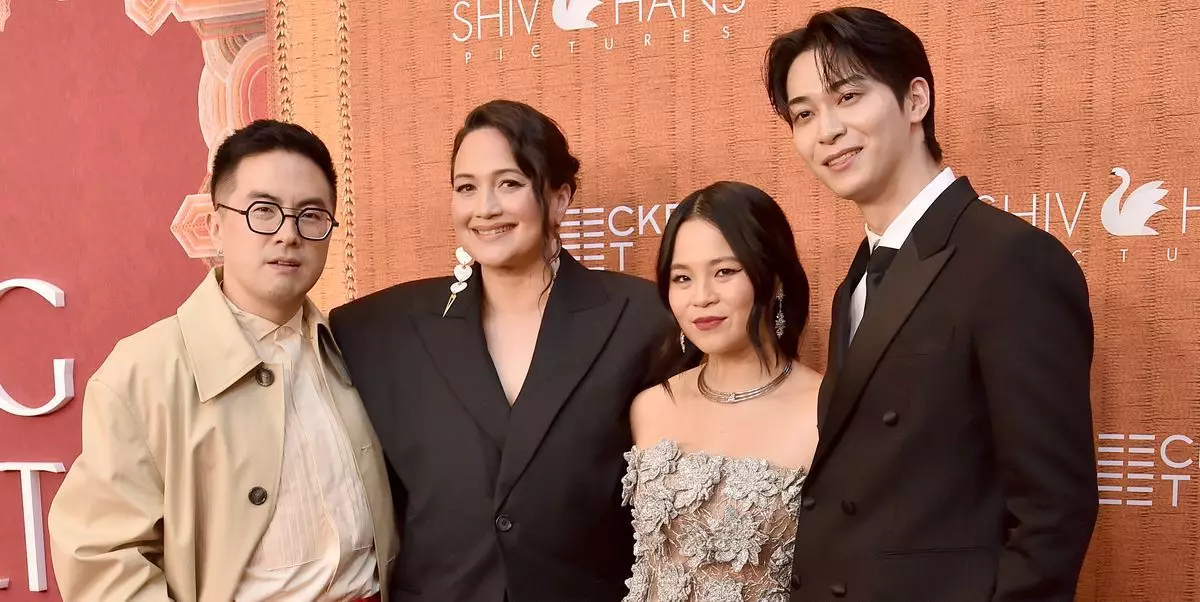In today’s cinematic landscape, storytelling continues to evolve, and one film that exemplifies this dynamic shift is Andrew Ahn’s reimagining of the 1993 classic, The Wedding Banquet. As a cinematic love letter to the complexities of queer identities, cultural expectations, and family dynamics, this modern tale shines a light on the ongoing struggles and triumphs of underrepresented communities. Featuring an impressive ensemble cast, including Kelly Marie Tran, Lily Gladstone, and Bowen Yang, the film emerges not only as an entertaining rom-com but also as an essential dialogue on identity in our society.
Set against the backdrop of vibrant Seattle, The Wedding Banquet navigates an intricate web of relationships, showcasing the story of Min, a closeted Korean heir. When he proposes a green card marriage to Angela (played by Tran), the narrative takes an unexpected turn. What may initially seem like a means to an end develops into an exploration of love, sacrifice, and the nuances of family. The arrangement deals not only with the practicalities of immigration but also with the emotional implications that resonate deeply in LGBTQ+ narratives.
True to Life Performances
Ahn has masterfully curated performances that push the boundaries of comedy while emphasizing genuine emotional connections. Gladstone’s portrayal of Lee, who balances the chaos surrounding her with a touch of humor, brings a refreshing perspective to the classic “straight man” archetype often found in romantic comedies. She describes the experience as liberating, encouraging her to explore her own comedic instincts while navigating the labyrinth of cultural expectations. This reveals a significant shift in the industry, where performers are encouraged to showcase their authentic selves, enriching the narrative without being confined by stereotypes.
Tran’s experience on the set was profoundly cathartic, characterized by her bold decision to come out publicly as queer during production. This moment is not just a personal milestone; it is a reflection of the changing tides in Hollywood, where artists feel increasingly empowered to express their identities openly. Her sentiment encapsulates the essential hopefulness that permeates through the film: the idea that love in all its forms deserves to be celebrated without shame or hesitation.
Cultural Commentary Through Humor
Perhaps one of the most compelling aspects of The Wedding Banquet is its ability to encapsulate cultural commentary within an engaging narrative. The film cleverly juxtaposes the intense pressures of family expectations against the desire for personal fulfillment. The arrival of Min’s traditional grandmother, who insists on orchestrating a breathtaking Korean wedding, blurs the lines between obligation and authenticity, illustrating the complexities faced by individuals who straddle multiple cultures.
This thematic depth is further enriched by James Schamus’ involvement in the screenplay. A collaborator from the original film, his return signifies a commitment to preserving the essence of the story while ensuring that it resonates with a contemporary audience. Schamus’ deft hand in navigating these cross-cultural themes allows the film to maintain its charm while expanding its narrative scope. The result is a film that invites viewers not to simply witness a wedding but to engage in a broader conversation about love—romantic, familial, and chosen.
Building Community Through Art
Ahn’s vision extends beyond the mere creation of a film; he views filmmaking as a collective endeavor that fosters connections among its collaborators. His dedication to forming a supportive environment on set serves as a testament to the power of community in both the artistic and real-world landscapes. As Ahn noted, these experiences foster lifelong bonds, enriching not only the film but the lives of those involved.
The Wedding Banquet transcends the boundaries of time, with aspirations that resonate in every era. Gi-chan, portraying Min, aptly points out that this is not just a story defined by “good timing,” but rather a tale that stands as relevant and poignant across generations. The film’s broad reflection on love—be it familial, romantic, or found—invites audiences to examine their own relationships and the multifaceted meanings they hold.
As The Wedding Banquet makes its way into theaters, it heralds a new chapter in queer cinema—one that celebrates diversity, advocates for representation, and opens the doors for dialogues long overdue. With the potential for streaming availability later this year, audiences are poised to embrace this beautiful, nuanced exploration of modern love and identity.

